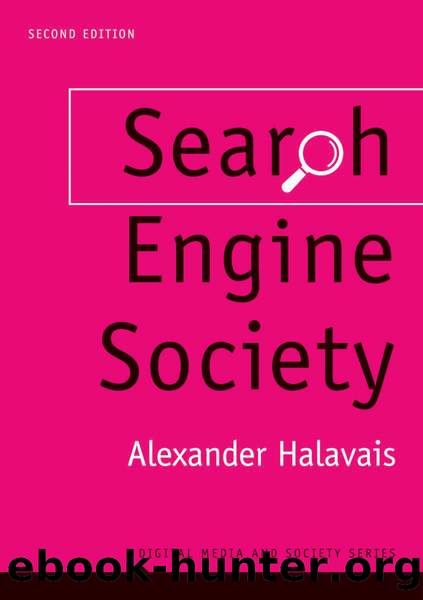Search Engine Society by Halavais Alexander;

Author:Halavais, Alexander; [Halavais, Alexander]
Language: eng
Format: epub
Publisher: Polity Press
Published: 2017-12-04T00:00:00+00:00
Search and traditional knowledge institutions
The prototypical web search is often that of the scholar, academic, or student seeking authoritative knowledge on the web. The reasons for this prototype are varied. Many search engines, including Google, have been developed by those working in academic settings. Moreover, the history of information retrieval has until more recently been closely tied to traditional libraries as authoritative repositories of knowledge. Libraries can be used to discover a wide range of information, both practical and scholarly, but do not reflect the full breadth of queries found on the web. The world of scholarship is not the sole source of knowledge for a society – far from it. Scholars have, however, for many centuries, been primarily involved in creating, storing, finding, indexing, and evaluating recorded work. It makes sense, then, when seeking out an understanding of search engines, to examine how these technologies are related to changes in academic research.
It is difficult to draw a clean line between the technologies that drive internet search engines and those used for library search, as they frequently draw upon one another. Some evidence can be found in citations of online materials in formal academic publishing, but even here, the fact that many scholarly resources are now available online, though not necessarily openly accessible, means that it is difficult to discern an online citation from a citation to a printed journal. A number of factors affect the decision to draw from online materials when doing research, including the availability of work online, and its accessibility by a given researcher. As long as a scholar has physical access to the internet, their self-perceived online skills are the most salient factor in determining the use of online resources (Y. Zhang 2001). Even once the more traditional barriers to using online work – access and skill – are overcome, it seems that there remain institutional and organizational impediments.
Search engines are derived from systems that have been used for many years to perform electronic searches of the literature from within libraries, or through paid services. Two of the largest and most complete indexes are the Web of Science and Scopus. These two indexes have a well-earned reputation for the reach of their indexes, the quality of the work they index, and the reliability of their citation data. Some universities base academic advancement on the citations found in the Web of Science, an indication of both its status in the academic community and the relationship of search technology to the institutionalized power of the academy. Until recently, it would have been hard to imagine that metrics built on open search engines like Google Scholar could rival these established search systems (Delgado López-Cózar & Cabezas-Clavijo 2012), and yet those exploring “altmetrics” often turn to social media mentions as better indicators of impact (Thelwall et al. 2013). There is something enchanting about the ease with which a search may be accomplished on Google Scholar, and its ability to quickly identify the most frequently cited articles on a topic.
Download
This site does not store any files on its server. We only index and link to content provided by other sites. Please contact the content providers to delete copyright contents if any and email us, we'll remove relevant links or contents immediately.
What's Done in Darkness by Kayla Perrin(25500)
Shot Through the Heart: DI Grace Fisher 2 by Isabelle Grey(18219)
Shot Through the Heart by Mercy Celeste(18160)
The Fifty Shades Trilogy & Grey by E L James(17774)
The 3rd Cycle of the Betrayed Series Collection: Extremely Controversial Historical Thrillers (Betrayed Series Boxed set) by McCray Carolyn(13189)
The Subtle Art of Not Giving a F*ck by Mark Manson(12912)
Scorched Earth by Nick Kyme(11832)
Stepbrother Stories 2 - 21 Taboo Story Collection (Brother Sister Stepbrother Stepsister Taboo Pseudo Incest Family Virgin Creampie Pregnant Forced Pregnancy Breeding) by Roxi Harding(11040)
Drei Generationen auf dem Jakobsweg by Stein Pia(10217)
Suna by Ziefle Pia(10186)
Scythe by Neal Shusterman(9259)
International Relations from the Global South; Worlds of Difference; First Edition by Arlene B. Tickner & Karen Smith(8608)
Successful Proposal Strategies for Small Businesses: Using Knowledge Management ot Win Govenment, Private Sector, and International Contracts 3rd Edition by Robert Frey(8419)
This is Going to Hurt by Adam Kay(7695)
Dirty Filthy Fix: A Fixed Trilogy Novella by Laurelin Paige(6453)
He Loves Me...KNOT by RC Boldt(5804)
How to Make Love to a Negro Without Getting Tired by Dany LaFerrière(5378)
Interdimensional Brothel by F4U(5304)
Thankful For Her by Alexa Riley(5161)
